Word of Life – July 2018
In his second letter to the community in Corinth, St. Paul writes to people who were questioning the legitimacy of his apostolic activity. However, he does not defend himself by listing his own merits and achievements. On the contrary, he highlights the work that God has accomplished in him and through him. St. Paul mentioned a mystical experience of a deep relationship with God (2 Cor 11:1-7), but immediately shared his suffering due to a “thorn” that tormented him. He did not explain exactly what it was, but we realize it caused great difficulty and could have limited his activity as an evangelizer. For this reason, he shared the fact that he had asked God to free him from that impediment. But the answer he received from God himself was mind-blowing: “My grace is sufficient for you, for power is made perfect in weakness.” All of us continually experience our own physical, psychological and spiritual weaknesses, as well as those of others. We often see around us people who are suffering and can’t find the way ahead. We feel weak and unable to solve all these problems, or even face them. At most we limit ourselves to not hurting anyone. St. Paul’s experience, on the other hand, opens up a new horizon. By recognizing and accepting our weakness, we can abandon ourselves fully into the hands of the Father, who loves us as we are and wants to help us on our journey. In fact, the letter goes on, saying: “For whenever I am weak, then I am strong” (2 Cor 12:10). In this regard, Chiara Lubich wrote: “We naturally react against such a statement, seeing in it a glaring contradiction or simply a paradox. Instead, it expresses one of the highest truths of the Christian faith. “Jesus explained it to us with his life and above all with his death. When did he accomplish the task that the Father had entrusted to him? When did he redeem humanity? When did he conquer sin? It was when he died on the cross, after having cried out, ‘My God, my God, why have you forsaken me?’ (Mt 27:46). “Jesus was strongest just at his weakest moment. He could have given life to the new people of God just by preaching, doing a few more miracles or some extraordinary deed. Instead it was not so because the Church is the work of God, and it is in suffering, and only in suffering, that the works of God flourish. “So our weakness and the experience of our fragility present unique opportunities to experience the strength of Christ who died and is risen.” “My grace is sufficient for you, for power is made perfect in weakness.” It is the paradox of the Gospel: the meek are promised they will inherit the earth (Mt 5:5). In the Magnificat, Mary exalts the power of the Lord, who expresses himself totally and definitively in our personal history and in human history, precisely in the setting of littleness and total trust in God’s action (see Lk 1:46-55). Commenting on St. Paul’s experience, Chiara suggests that “the choice we Christians can make is the exact opposite of what people usually do. Here we are truly going against the flow. In the world, people’s ideals lie in success, power and prestige … On the contrary, St. Paul tells us we must boast of our weaknesses … “Let’s trust in God. He will make good use of our weaknesses and nothingness. And when he is at work, we can be sure that he does things that are valuable, that bring about lasting good and meet the real needs of individuals and the community.” Letizia Magri
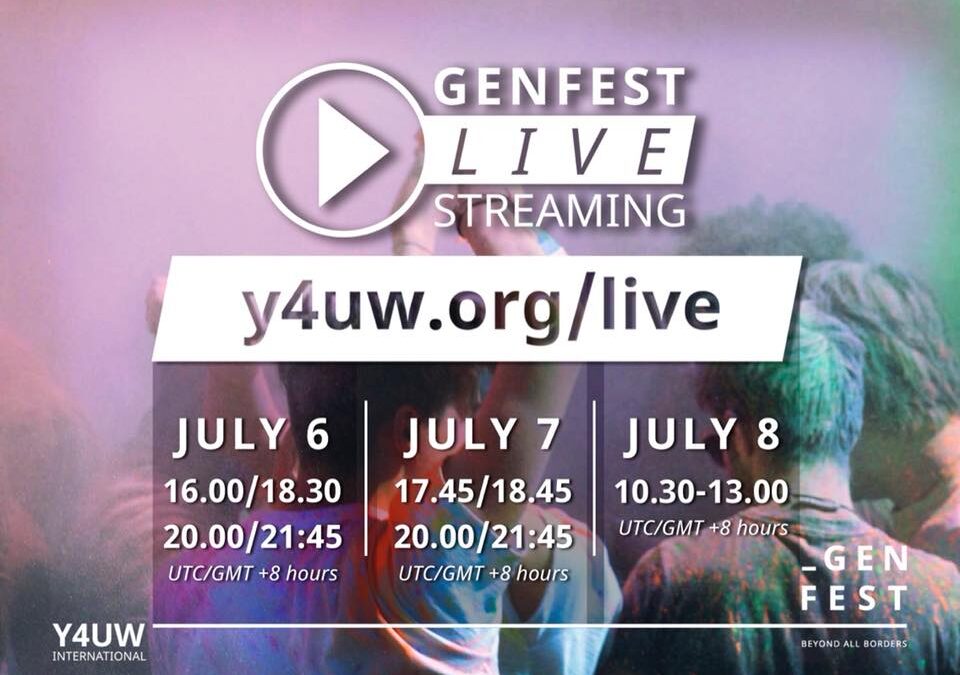
Genfest 2018: “from I to us”
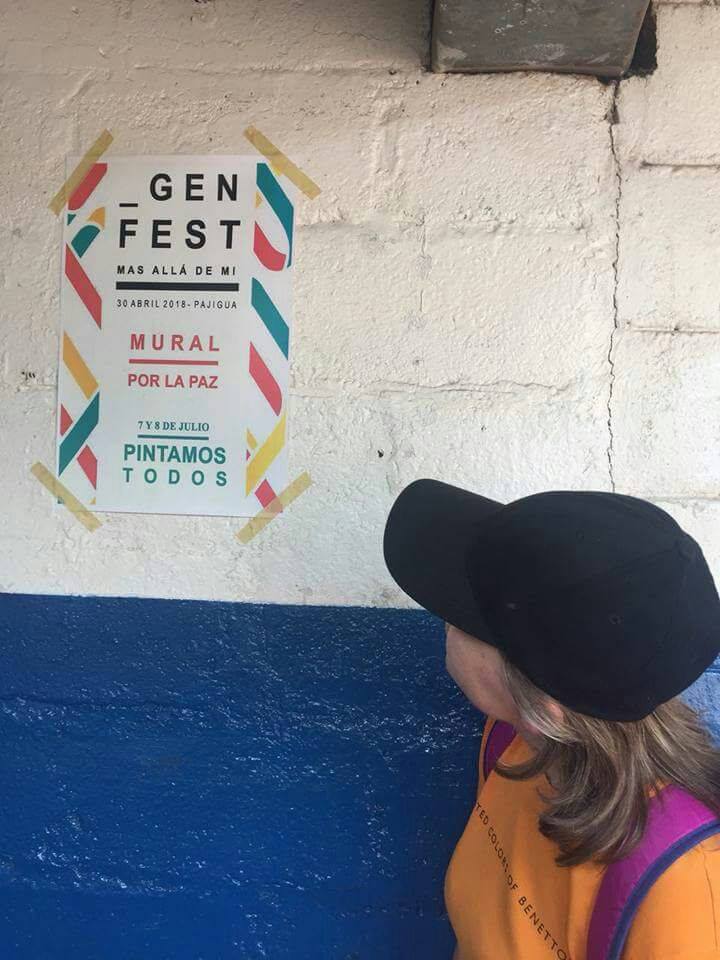 Defending borders, enforcing rejection, alliances between states to protect national identities and economies, restrictions to control migratory flows. What is behind these key-words? “Very often building some sort of fence or having an attitude of safe keeping stems from fear” – explains Maria Voce, president of the Focolari. “Yet, this does not seem to be the definite solution for young people. Instead they believe that borders are horizons, points of departure, an enriching diversity”. This is why the Focolari Youth have opted for the important theme of borders – hence the title “Beyond all borders” – for their next world event that will be held in Manila from 6 to 8 July. . They want to invite for a brave change of outlook on peoples, cultures and economies. They claim that a radical change is needed in such times of exasperation of particularisms and social closures. Born in 1973 from an idea of Chiara Lubich, founder of the Focolari, the Genfest arrives at its eleventh edition; for the first time it will be held outside Europe. It will take place in the capital city of the Philippines from 6 to 8 July and 6,000 young people, aged 18 to 30 years, are expected to attend. Thousands of others will participate in the other 23 local editions that are being prepared. “We chose Asia because six out every ten young people in the world live there” – says Kiara Lauren, a Filipina,who is one of the Youth for a United World, promoters of the event. “Despite its socio-economic problems and differnces, this continent speaks to the world about hope and desire for change. We do not recognize ourselves in this international geo-political context that quite often sacrifices whole peoples for the sake of some élite. We would like individuals and our nations to look beyond their personal, cultural, religious and political boundaries, to meet others and let themselves be contaminated by diversity.The Genfest will be a unique laboratory in the world: those who will take part in it will find the necessary instruments to change themselves and their environment. As Pope Francis augured during his recent visit to Loppiano, they will be able to change “I” into “we”.
Defending borders, enforcing rejection, alliances between states to protect national identities and economies, restrictions to control migratory flows. What is behind these key-words? “Very often building some sort of fence or having an attitude of safe keeping stems from fear” – explains Maria Voce, president of the Focolari. “Yet, this does not seem to be the definite solution for young people. Instead they believe that borders are horizons, points of departure, an enriching diversity”. This is why the Focolari Youth have opted for the important theme of borders – hence the title “Beyond all borders” – for their next world event that will be held in Manila from 6 to 8 July. . They want to invite for a brave change of outlook on peoples, cultures and economies. They claim that a radical change is needed in such times of exasperation of particularisms and social closures. Born in 1973 from an idea of Chiara Lubich, founder of the Focolari, the Genfest arrives at its eleventh edition; for the first time it will be held outside Europe. It will take place in the capital city of the Philippines from 6 to 8 July and 6,000 young people, aged 18 to 30 years, are expected to attend. Thousands of others will participate in the other 23 local editions that are being prepared. “We chose Asia because six out every ten young people in the world live there” – says Kiara Lauren, a Filipina,who is one of the Youth for a United World, promoters of the event. “Despite its socio-economic problems and differnces, this continent speaks to the world about hope and desire for change. We do not recognize ourselves in this international geo-political context that quite often sacrifices whole peoples for the sake of some élite. We would like individuals and our nations to look beyond their personal, cultural, religious and political boundaries, to meet others and let themselves be contaminated by diversity.The Genfest will be a unique laboratory in the world: those who will take part in it will find the necessary instruments to change themselves and their environment. As Pope Francis augured during his recent visit to Loppiano, they will be able to change “I” into “we”.  The programme: sharing and working A lot of space will be given to exp eriences: the joint effort of young Americans and Mexicans on the border between their two countries; gestures of help and reconciliation in situations of conflict in Africa and the Middle East; supporting and welcoming people that live in refugee camps; commitment to a new way of doing politics, dialogue between different religions, etc. On July 7, in the afternoon, the Genfest is proposing the activity: Hands forHumanity. Those present will be able to partcipate in any one of 12 activities of solidarity and urban redevelopment that will be organized in different parts of Manila. Through these activities one can find out that small gestures can bring change and also have the opportunity to collect imitable ideas that can be exported to one’s own country.
The programme: sharing and working A lot of space will be given to exp eriences: the joint effort of young Americans and Mexicans on the border between their two countries; gestures of help and reconciliation in situations of conflict in Africa and the Middle East; supporting and welcoming people that live in refugee camps; commitment to a new way of doing politics, dialogue between different religions, etc. On July 7, in the afternoon, the Genfest is proposing the activity: Hands forHumanity. Those present will be able to partcipate in any one of 12 activities of solidarity and urban redevelopment that will be organized in different parts of Manila. Through these activities one can find out that small gestures can bring change and also have the opportunity to collect imitable ideas that can be exported to one’s own country. 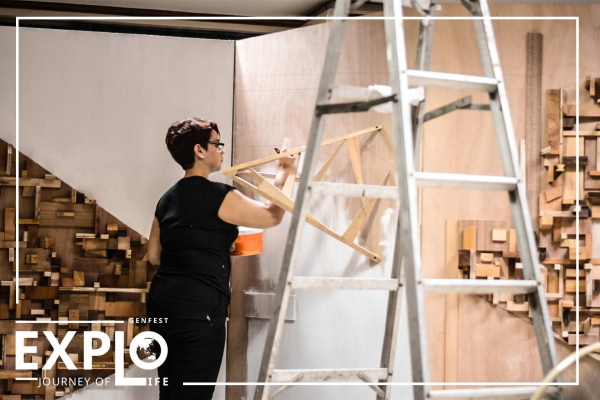 Explo and Forum: learn and experience peace Then, there is the Explo, an acronym composed by the words “Exposition” and Exploration”: this is an interactive exhibition that leads the visitor through an immersive sensorial experience of the history of humanity, from the perspective of universal fraternity: “So it is not the history we know” – says Erika Ivacson, a Hungarian artist, curator of the exhibition – “made of wars, conquests, armistices. Instead, we will relate what has made humanity progress from the point of view of peace, of friendship between individuals, peoples and cultures. The last stage will be entirely dedicated to the question: and what can I do? “. There will be 110 forums and workshops on key issues about the construction of open and supportive societies: from urban cleaning techniques and care of the territory, to social enterprise forms, to the management of personal and political conflicts, to the use of social media for peace, and much more. Follow the Genfest It will be possible to follow the live streaming, broadcast in English with translations in French, Italian, Portuguese and Spanish through the Youth for a United World website: http://www.y4uw.org/live Timetable live streaming (Manila time, UTC/GMT +8 ore): 6 July: 16-18:30 e 20-21:45 7 July: 17:45-18:45 e 20-21:45 8 July: 10:30-13 Social media regarding the event: Facebook: www.facebook.com/genfest/ o @genfest Twitter: https://twitter.com/genfest_en o @genfest_en Instagram: www.instagram.com/genfest.official/ Youtube: genfest-official or https://www.youtube.com/c/GenfestOfficial Genfest Programme Press Office Stefania Tanesini Cell. +63 9664661016 Whatsapp +39 338 5658244 stefania.tanesini@focolare.org
Explo and Forum: learn and experience peace Then, there is the Explo, an acronym composed by the words “Exposition” and Exploration”: this is an interactive exhibition that leads the visitor through an immersive sensorial experience of the history of humanity, from the perspective of universal fraternity: “So it is not the history we know” – says Erika Ivacson, a Hungarian artist, curator of the exhibition – “made of wars, conquests, armistices. Instead, we will relate what has made humanity progress from the point of view of peace, of friendship between individuals, peoples and cultures. The last stage will be entirely dedicated to the question: and what can I do? “. There will be 110 forums and workshops on key issues about the construction of open and supportive societies: from urban cleaning techniques and care of the territory, to social enterprise forms, to the management of personal and political conflicts, to the use of social media for peace, and much more. Follow the Genfest It will be possible to follow the live streaming, broadcast in English with translations in French, Italian, Portuguese and Spanish through the Youth for a United World website: http://www.y4uw.org/live Timetable live streaming (Manila time, UTC/GMT +8 ore): 6 July: 16-18:30 e 20-21:45 7 July: 17:45-18:45 e 20-21:45 8 July: 10:30-13 Social media regarding the event: Facebook: www.facebook.com/genfest/ o @genfest Twitter: https://twitter.com/genfest_en o @genfest_en Instagram: www.instagram.com/genfest.official/ Youtube: genfest-official or https://www.youtube.com/c/GenfestOfficial Genfest Programme Press Office Stefania Tanesini Cell. +63 9664661016 Whatsapp +39 338 5658244 stefania.tanesini@focolare.org 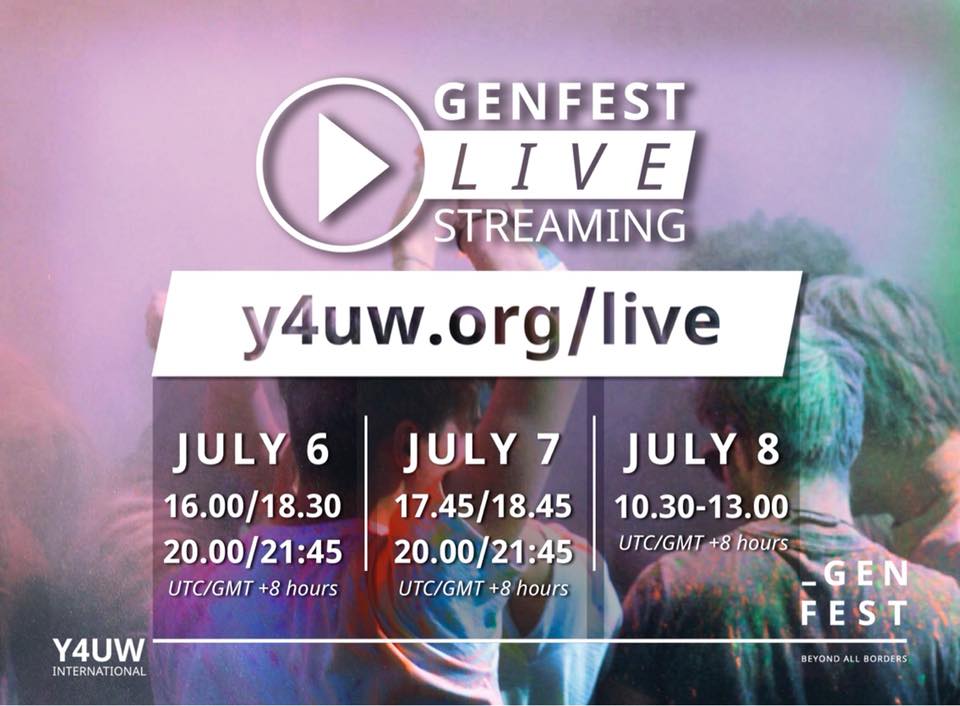
Living the Gospel: peace-makers
Meeting Jesus Since I becoming mayor of our town I cannot walk along the street without someone stopping me to discuss an issue or just to greet me. Even when I’m in church, I find it difficult to be alone with Jesus. So one Sunday I went to Mass in a nearby town, hoping not to be recognized. When I got there, I found the church was packed with people attending a special liturgy celebrated by the bishop. I saw a woman sitting outside the church and I gave her some money. A little further on, there was another person begging, a man with a badly disfigured face. I walked passed him. But then it was as if I heard a voice inside me saying: “You came here because you wanted to meet Me. Here I am, in this poor woman and in this man who is suffering”. I turned back. The man was still there, happy that I had come back to find him. G. – Italy Superstition I got into a taxi and noticed that the car was full of “charms”, indicating the superstitious beliefs of the driver. As we drove along, I took courage and said, “You know, I believe in God, and I place all my trust in Him alone”. He listened to my words in silence. A few weeks later, I called for a taxi again and to my surprise I discovered it was the same driver in the same car. With even greater surprise I noticed that all the charms had disappeared, and a set of rosary beads was hanging from the rear-view mirror! N. -Switzerland Teamwork Three of us – a nurse, a laboratory technician and a doctor – work in the same hospital, in different departments. We believe that living the Gospel can not only transform people individually but can also renew whole environments, work places and social structures. Motivated by this belief, we try to meet together before work every morning, even just for a moment to share our challenges, efforts and joys. We keep on discovering how our commitment to love everyone can be practically employed in our workplace in the exercise of our professional duties every day. E., L. and B. – Italy Money under the pillow I was walking out of church with my son when a woman came up and asked us for money. I opened my wallet and gave her what I found there, 20 Euro. My son was astounded and told me I had given her too much. But I reassured him that Jesus is present in each poor person and I felt it was right to give her all I had with me. When we got home I started to tidy up a room we had offered to guests who had just left, a couple from another city visiting a sick relative. My son came to help me. As he lifted up the pillow, we found 200 Euro lying there! We had freely offered these people the means to be able to stay close to a loved one who was suffering, and they had decided to respond in this way. M.G. – Italy The ice-hockey match I am a real fan of ice-hockey. One day I couldn’t wait for school to finish so I could rush home to watch a big match on television. As soon as the final bell rang, I sped away on my moped. But I had only gone a few meters when I realized I had a flat tyre. As fast as possible I tried to pump it up, but after another hundred meters it had gone down again. Then to cap it all, it started to rain. I could feel my temper getting worse with every step as I pushed my moped along the road. Then suddenly a thought came into my head: Jesus suffered so greatly on the cross, are you not able to accept this small inconvenience? And with that, I found peace within myself once more. G. – Holland

NetOne – Meeting for Directors
 NetOne is an international network of people involved in communication and media. “Media for a united world” is his mission.
NetOne is an international network of people involved in communication and media. “Media for a united world” is his mission.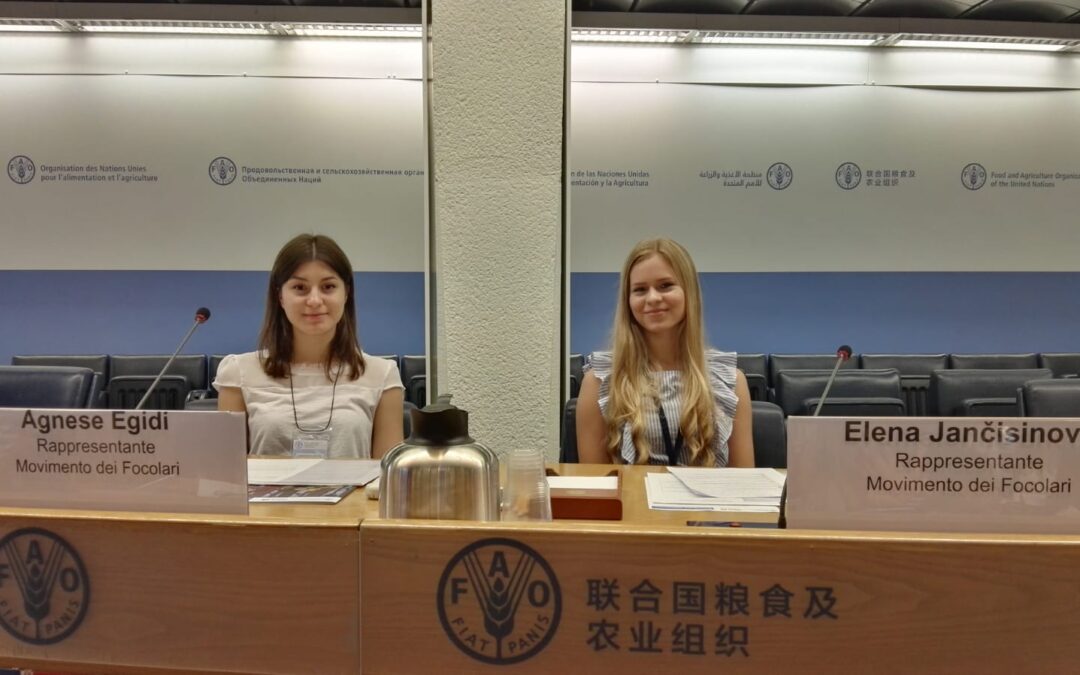
The first Zero Hunger citizens
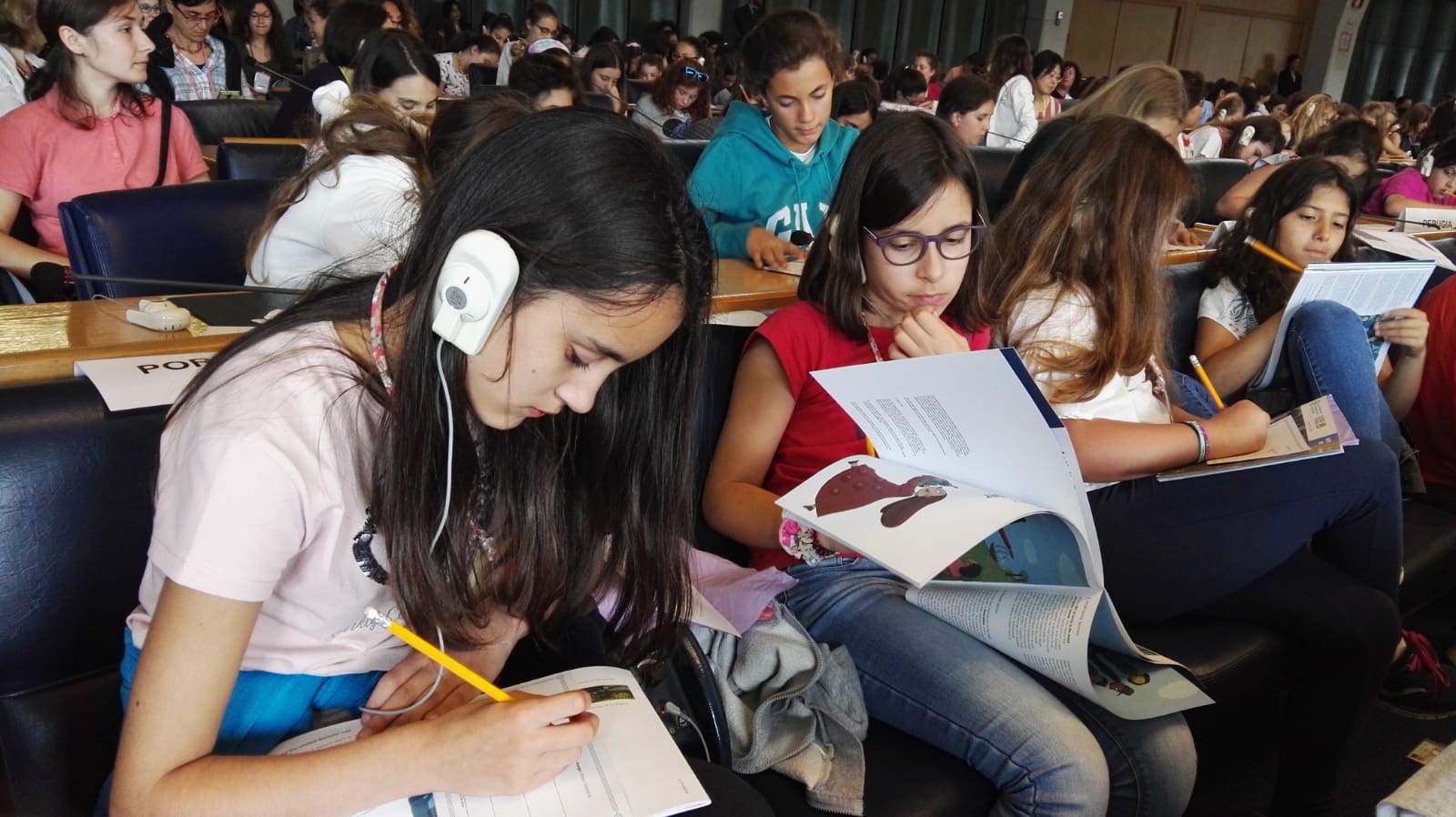 Today’s youth can become the first generation that will manage to eradicate hunger in the world. This is indicated by the 17 Sustainable Development Goals approved by the 193 United Nations Member States on September 25, 2015. The Member States agreed on the commitment to implement these goals within 15 years (2015-2030), and the “Zero Hunger Goal” is at the heart of the whole programme. The United Nations Food and Agriculture Organization (FAO) is very keen on achieving these objectives, so 630 young girls, aged 9 to 14 years, were gladly welcomed at its headquarters in Rome. This group of girls that belong to the Focolare Movement visited FAO on June 22, 2018. Many others worldwide followed this event through live streaming, and among them there were 400 young boys taking part in a congress at the Focolare International small town of Loppiano in Tuscany. It was the first time that the Movement’s young generations, who owe their origin to Chiara Lubich, were favoured with such an opportunity, that thrilled not only the girls seated in the prestigious plenary hall, but also FAO. “I’m so pleased to see this hall so full of young women”, commented Marcela Villareal, the FAO director for the division of partnerships and South-South cooperation. “I’ve been working here at FAO for more than 20 years and I have delivered many speeches in this hall, but I’ve never seen it so beautiful, so full of young ladies. Thank you for your all support towards the Zero Hunger goal”. Today, there are 800 million people in the world who suffer from hunger. After steadily declining for over a decade, owing to violent conflicts and climate change, global hunger appears to be on the rise. Villareal said: “For us here at FAO, this is the biggest scandal and we struggle daily not only to provide the necessary food but also a decent living, where children can live a full life. We are convinced that through our work we can achieve a world without hunger”. The United Nations signed the sustainable development agenda in September 2015; this includes 17 goals that are to be achieved by 2030. Sabina Zaccaro, from the FAO office for institutional communication said: “Never before have world leaders pledged to commit themselves together to such a wide and universal agenda. To defeat world hunger (objective no.2), we need to overcome poverty (objective no.1). But to do this we must all live a sustainable way of life (objective no.12), while we combat the climate change through specific means(objective n.13)”.
Today’s youth can become the first generation that will manage to eradicate hunger in the world. This is indicated by the 17 Sustainable Development Goals approved by the 193 United Nations Member States on September 25, 2015. The Member States agreed on the commitment to implement these goals within 15 years (2015-2030), and the “Zero Hunger Goal” is at the heart of the whole programme. The United Nations Food and Agriculture Organization (FAO) is very keen on achieving these objectives, so 630 young girls, aged 9 to 14 years, were gladly welcomed at its headquarters in Rome. This group of girls that belong to the Focolare Movement visited FAO on June 22, 2018. Many others worldwide followed this event through live streaming, and among them there were 400 young boys taking part in a congress at the Focolare International small town of Loppiano in Tuscany. It was the first time that the Movement’s young generations, who owe their origin to Chiara Lubich, were favoured with such an opportunity, that thrilled not only the girls seated in the prestigious plenary hall, but also FAO. “I’m so pleased to see this hall so full of young women”, commented Marcela Villareal, the FAO director for the division of partnerships and South-South cooperation. “I’ve been working here at FAO for more than 20 years and I have delivered many speeches in this hall, but I’ve never seen it so beautiful, so full of young ladies. Thank you for your all support towards the Zero Hunger goal”. Today, there are 800 million people in the world who suffer from hunger. After steadily declining for over a decade, owing to violent conflicts and climate change, global hunger appears to be on the rise. Villareal said: “For us here at FAO, this is the biggest scandal and we struggle daily not only to provide the necessary food but also a decent living, where children can live a full life. We are convinced that through our work we can achieve a world without hunger”. The United Nations signed the sustainable development agenda in September 2015; this includes 17 goals that are to be achieved by 2030. Sabina Zaccaro, from the FAO office for institutional communication said: “Never before have world leaders pledged to commit themselves together to such a wide and universal agenda. To defeat world hunger (objective no.2), we need to overcome poverty (objective no.1). But to do this we must all live a sustainable way of life (objective no.12), while we combat the climate change through specific means(objective n.13)”. 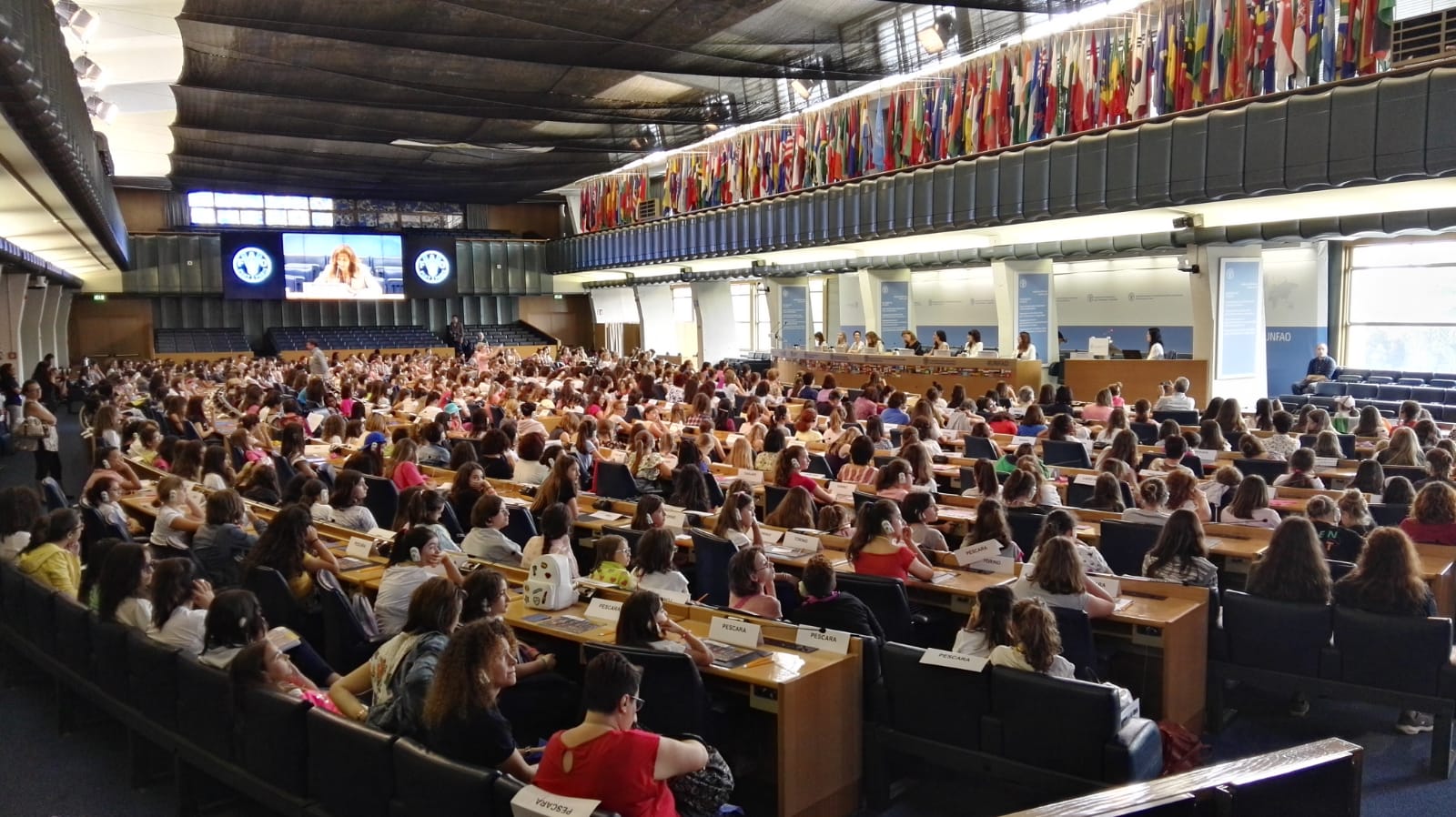 The first Zero Hunger citizens The Focolare youth, scattered all over the world, can give a strong personal daily contribution towards the achievement of the Zero Hunger goal by 2030. On October 16, 2018 FAO will celebrate its 73rd year and it will have the opportunity to re-launch this objective. Clara Velez, Head of the FAO office for the dissemination of promotional activities confirmed: “We will avail ourselves of this occasion to speak about various topics on newspapers, TV, in schools, on streets. Each year we are focussing on a particular issue (immigration, climate change…..), and this year our focus will be on zero hunger. It’s marvellous having you here with us today. On October 16, representatives from all countries will be seated in this same hall and they will be given the book you have received today.This book explains how we can combat hunger through our daily actions. The passport on its last page entitles you to become the first Zero Hunger citizens, with rights and duties that need to be respected”. But what are the duties of Zero Hunger citizens? Laura Hernandez from the FAO office for dissemination and promotional activities maintained: “One third of the food produced in the world is wasted and thrown away. I’m convinced that you do not want to participate in this scandal. There are certain things we can do at home. For example, when food is left over, one can freeze it or eat it the next day. When we go to a restaurant and do not manage to finish eating all the food, we can consume it later at home. Then, do check the food labels and do not be deceived. The expiry date indicates the date when the food ceases to be good for consumption; but if the label states that the food is “preferably consumed by…”, this means that it can be consumed even a few days after that date. Another important and precious commodity is water. We must not waste water, so the tap should be closed while we brush our teeth. And mum and dad should be reminded to use the dishwasher at full capacity, or to use the dryer only when needed”.
The first Zero Hunger citizens The Focolare youth, scattered all over the world, can give a strong personal daily contribution towards the achievement of the Zero Hunger goal by 2030. On October 16, 2018 FAO will celebrate its 73rd year and it will have the opportunity to re-launch this objective. Clara Velez, Head of the FAO office for the dissemination of promotional activities confirmed: “We will avail ourselves of this occasion to speak about various topics on newspapers, TV, in schools, on streets. Each year we are focussing on a particular issue (immigration, climate change…..), and this year our focus will be on zero hunger. It’s marvellous having you here with us today. On October 16, representatives from all countries will be seated in this same hall and they will be given the book you have received today.This book explains how we can combat hunger through our daily actions. The passport on its last page entitles you to become the first Zero Hunger citizens, with rights and duties that need to be respected”. But what are the duties of Zero Hunger citizens? Laura Hernandez from the FAO office for dissemination and promotional activities maintained: “One third of the food produced in the world is wasted and thrown away. I’m convinced that you do not want to participate in this scandal. There are certain things we can do at home. For example, when food is left over, one can freeze it or eat it the next day. When we go to a restaurant and do not manage to finish eating all the food, we can consume it later at home. Then, do check the food labels and do not be deceived. The expiry date indicates the date when the food ceases to be good for consumption; but if the label states that the food is “preferably consumed by…”, this means that it can be consumed even a few days after that date. Another important and precious commodity is water. We must not waste water, so the tap should be closed while we brush our teeth. And mum and dad should be reminded to use the dishwasher at full capacity, or to use the dryer only when needed”. 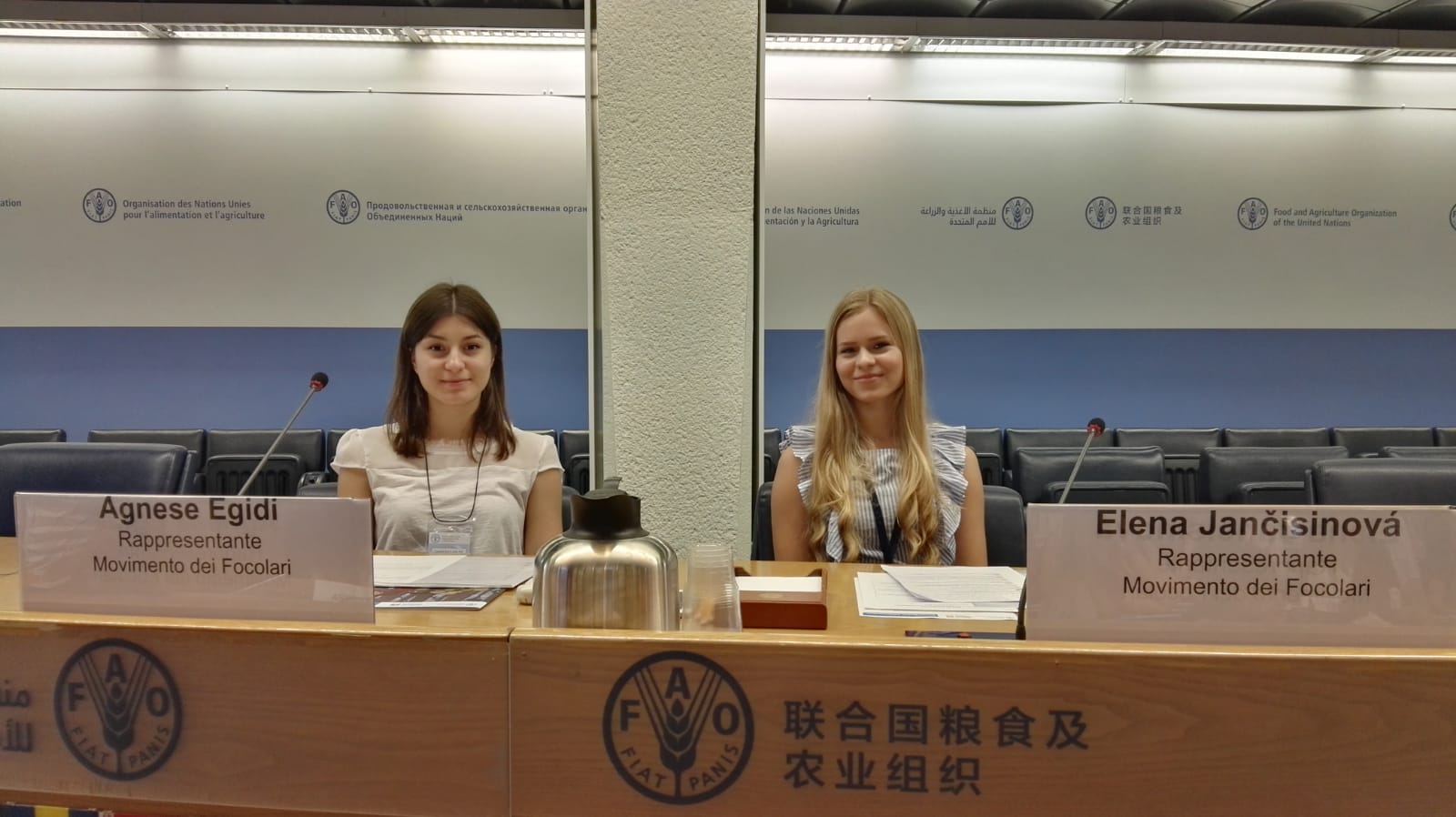 The Commitment Statement Finally even the girls voiced their thoughts. Elena and Agnes, who represented them said: “We are very honoured and happy to be here. From now on we will definitely contribute towards this goal with greater enthusiasm. We do feel part of the zero hunger generation. And what a great dream it is to imagine a world without hunger, even thanks to our contribution towards it! We are so happy to collaborate with FAO, because it is only by joining forces that we can manage to achieve such a high goal as Zero Hunger by 2030”. Focolare children and teenagers in 11 countries have been gathering ideas to try and find out how the problem of world hunger can be solved. “Our three H motto: head, heart and hands originated from these ideas, and our Commitment Statement came into being. Head for us means that we have to inform ourselves and study the problem both at a global and local level. Heart means that we that we have to make ourselves and others aware, and involve as many people as possible to achieve our goal. Then we need to act, so we have to make use of our hands” At the end of their visit, the girls handed over their Commitment Statement to FAO and there was the symbolic gesture of the passport: the girls wrote their commitments on this small document and signed it. They became the first #Zero Hunger citizens. Lorenzo Russo
The Commitment Statement Finally even the girls voiced their thoughts. Elena and Agnes, who represented them said: “We are very honoured and happy to be here. From now on we will definitely contribute towards this goal with greater enthusiasm. We do feel part of the zero hunger generation. And what a great dream it is to imagine a world without hunger, even thanks to our contribution towards it! We are so happy to collaborate with FAO, because it is only by joining forces that we can manage to achieve such a high goal as Zero Hunger by 2030”. Focolare children and teenagers in 11 countries have been gathering ideas to try and find out how the problem of world hunger can be solved. “Our three H motto: head, heart and hands originated from these ideas, and our Commitment Statement came into being. Head for us means that we have to inform ourselves and study the problem both at a global and local level. Heart means that we that we have to make ourselves and others aware, and involve as many people as possible to achieve our goal. Then we need to act, so we have to make use of our hands” At the end of their visit, the girls handed over their Commitment Statement to FAO and there was the symbolic gesture of the passport: the girls wrote their commitments on this small document and signed it. They became the first #Zero Hunger citizens. Lorenzo Russo
